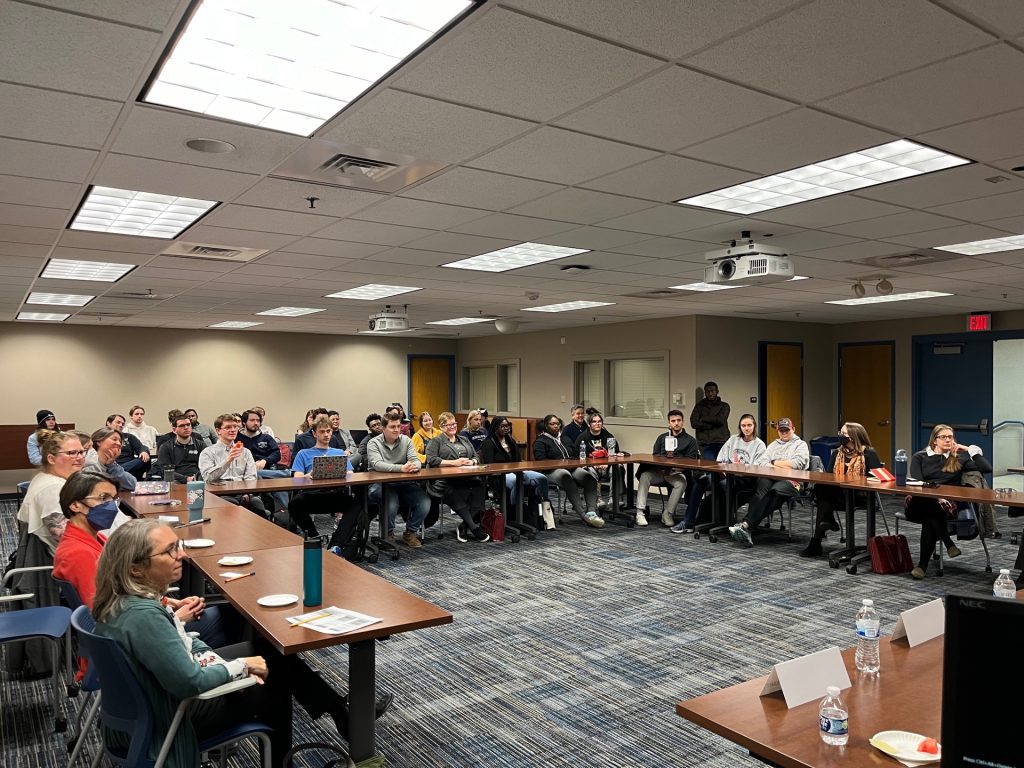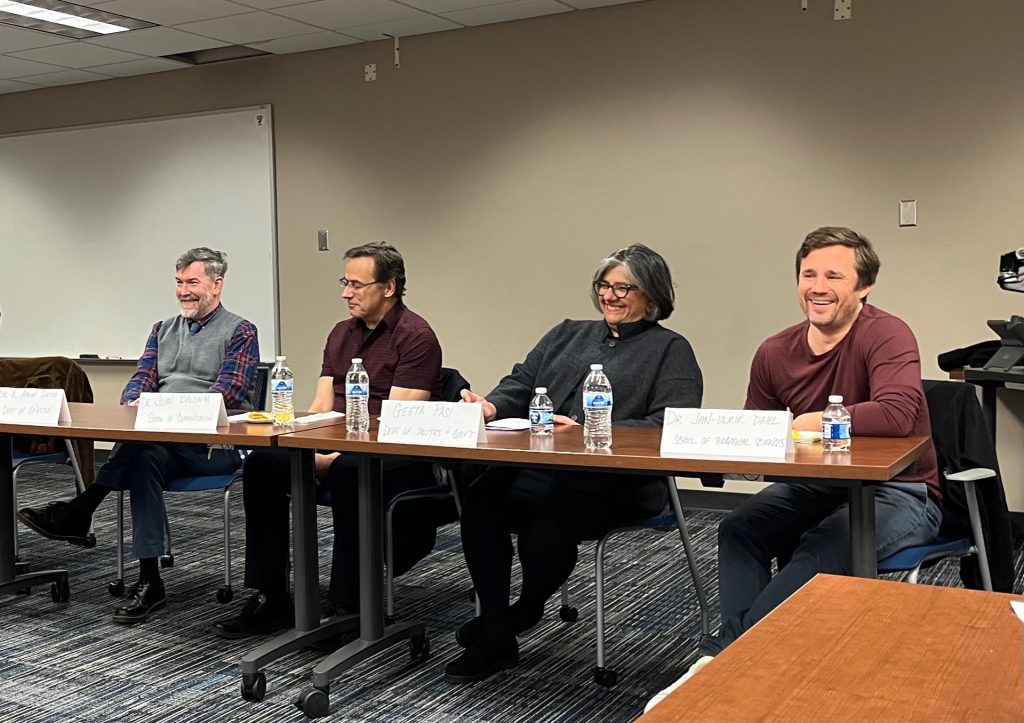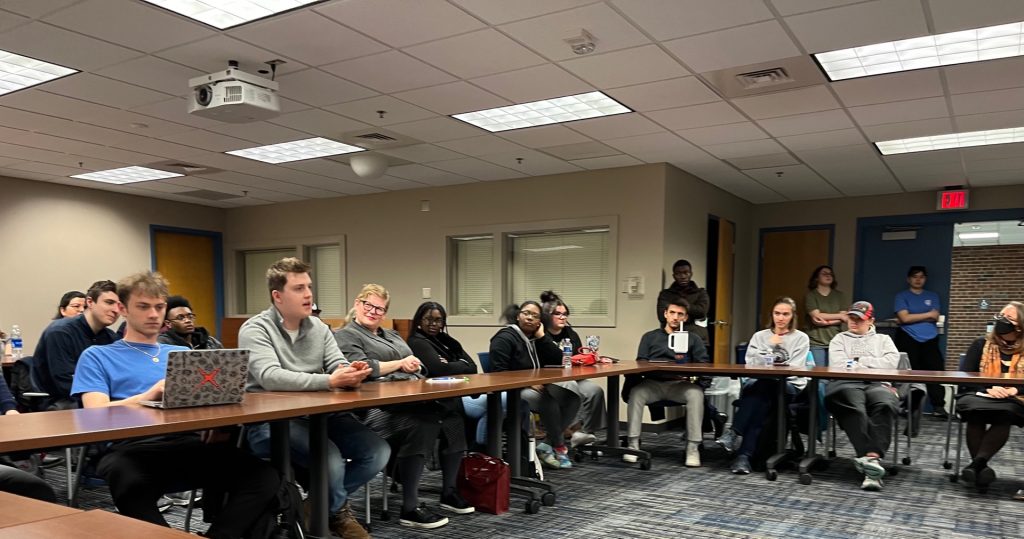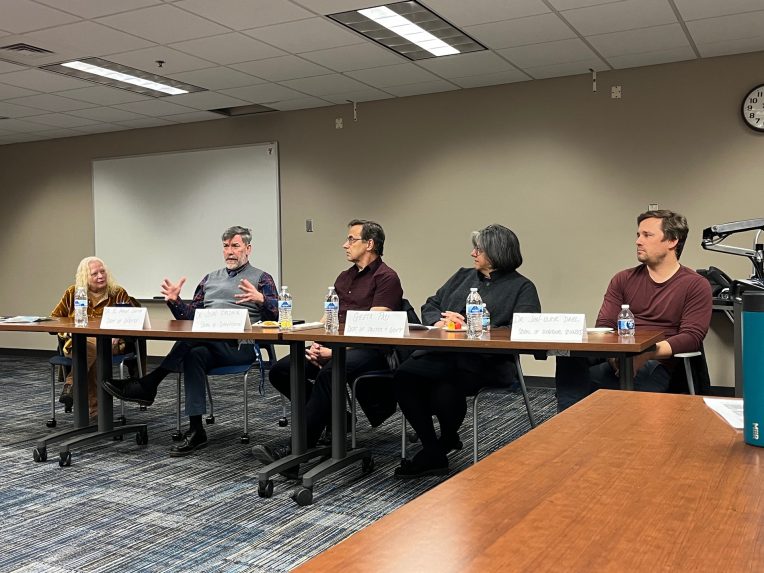“Why Study Languages and How It Can Benefit Your Career”, organized by Dr. Elke Segelcke, professor of German, was standing room only on Wednesday evening. Each of the four panelists (all professors at Illinois State University) provided a background of the languages that they learned growing up and the reason(s) they took them. For some, it was required in junior and high school, for others, they knew they needed to know certain languages for their future professions, and for some, they just couldn’t learn enough languages. All panelists then provided insight on the real-life value of language far beyond requirements in school.
Dr. John Baldwin (Professor of Communications and Culture), couldn’t wait to learn Spanish as an elementary and junior high school student, after which he took French and German in high school, Greek and Hebrew for his undergrad studies and then spent two years living in Brazil and learning Portuguese. He has also taken several years of Italian in addition to other languages. When asked how well he speaks each of these languages he responded, “Fluency is a hard claim so I won’t claim I am, not even in English!” He has found knowing many languages useful at interesting times. While traveling in Italy he spoke French on the train and of course also some Italian, later that day at a restaurant the server spoke with him in Spanish, then, noticing people at the neighboring table spoke in Portuguese he struck up a conversation with them, and of course, he spoke English with his wife. In the end he said he was able to speak in 5 different languages all in one day – his dream! Dr. Baldwin also remarked that just as we learn our culture best when we travel and learn another culture, we learn English better when we learn another language.
Dr. Jan-Ulrik Dahl, (Assistant Professor of Microbiology), grew up in Germany and was required to learn three languages in school. He was not a fan of English, did enjoy Latin, and when he had the chance, he took biochemistry instead of French. But when his doctoral research took him to France, he found that they couldn’t speak English or German with him and he needed to learn French to communicate with his colleagues. Here at Illinois State, international students of all languages and cultures come to do research in his lab. He points out that “Language is the tool you need to connect to people. Especially in Europe where in each country, people speak a different language.” He also emphasized that in this time of increasing AI dominance, “…nothing can replace emotional intelligence.”



Geeta Pasi (Inaugural Donald F. McHenry Visiting Professor in Diplomacy and International Affairs), grew up in a home where her parents spoke some Hindi and Punjabi, but was encouraged instead to focus on English. She learned French and Spanish in high school, and took Russian in college in anticipation of majoring in chemistry. After not majoring in chemistry after all, she joined the Foreign Service and was trained in languages, often one-on-one for one year each in preparation for her assignments. She learned Romanian, Hindi, and Germany, among others and used these languages to help people in critical situations as well as with diplomats in other countries. She describes another great reason for speaking other languages is the ability to use them as a secret language that others can’t understand.
Dr. K Aaron Smith (Professor of Linguistics and Latin) grew up studying and learning all of the languages that he could. In college he majored in German and Spanish and spent a year studying in Austria. As an adult he learned Japanese and lived for several years in Japan. Among other languages he’s studied are Latin, Portuguese from Portugal, Korean, and Dutch.
Dr. Smith encouraged students to not hesitate in learning any language(s) if they are interested. While at ISU even if students don’t have time to major or minor, they should take as many courses as they can. Dr. Smith spoke in particular of notions of social justice in his presentation, saying that when we talk about diversity (race, class, gender), we should be certain to include language as one of those categories because of society’s tendency to place hierarchies on languages.
Students asked a number of questions during the panel. A political science student inquired about the consequences of globalization to which Dr. Smith responded that globalization is killing languages across the world. Although there are 7162 languages today, most are dying out, being usurped by larger languages such as Chinese, Japanese, French, German, Spanish, and of course, English. Losing languages spoken by fewer people will result in losing thousands of perspectives of the human condition. A lively discussion continued throughout the event.

